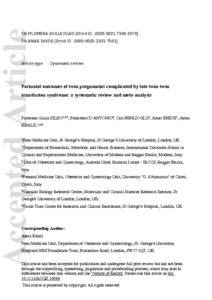Sileo, FG; D'Antonio, F; Benlioglu, C; Bhide, A; Khalil, A
(2021)
Perinatal outcomes of twin pregnancies complicated by late twin‐twin transfusion syndrome: A systematic review and meta‐analysis.
Acta Obstet Gynecol Scand, 100 (5).
pp. 832-842.
ISSN 1600-0412
https://doi.org/10.1111/aogs.14066
SGUL Authors: Bhide, Amarnath Khalil, Asma
![[img]](https://openaccess.sgul.ac.uk/112749/1.hassmallThumbnailVersion/aogs.14066.pdf)  Preview |
|
PDF
Accepted Version
Available under License ["licenses_description_publisher" not defined].
Download (12MB)
| Preview
|
Abstract
Introduction
Untreated twin‐to‐twin transfusion syndrome (TTTS) is associated with a high risk of perinatal mortality and morbidity. Laser surgery is recommended before 26 weeks of gestation. However, the optimal management in case of late TTTS (occurring after 26 weeks of gestation) is yet to be established.
Material and methods
We conducted a systematic review and meta‐analysis to evaluate the outcomes of monochorionic‐diamniotic twin pregnancies complicated by late TTTS according to different management options (expectant, laser therapy, amnioreduction, or delivery). The primary outcome was mortality, including single and double intrauterine, neonatal, and perinatal death. Secondary outcomes were composite morbidity, neuromorbidity, respiratory distress syndrome, admission to neonatal intensive care unit, intact survival (ie, free from neurological complications), and preterm birth before <32 weeks of gestation. Outcomes were reviewed according to the management and reported for the overall population of twins and disease status (ie, donor and recipient separately). Random‐effect meta‐analyses of proportions were used to analyze the data.
Results
Nine studies including 796 twin pregnancies affected by TTTS were included. No randomized controlled trials were available for inclusion. TTTS occurred at ≥26 weeks of gestation in 8.7% (95% CI 6.9%‐10.9%; 67/769) of cases reporting TTTS at all gestations. Intrauterine death occurred in 17.7% (95% CI 4.9%‐36.2%) of pregnancies managed expectantly, 5.3% (95% CI 0.9%‐12.9%) of pregnancies treated with laser, and 0% (95% CI 0%‐9%) after amnioreduction. Neonatal death occurred in 42.5% (95% CI 17.5%‐69.7%) of pregnancies managed expectantly, in 2.8% (95% CI 0.3%‐7.7%) of cases treated with laser, and in 20.2% (95% CI 6%‐40%) after amnioreduction. Only one study (10 cases) reported data on immediate delivery after diagnosis with no perinatal deaths. Perinatal death incidence was 55.7% (95% CI 31.4%‐78.6%) in twin pregnancies managed expectantly, 5.6% (95% CI 0.5%‐15.3%) in those treated with laser, and 20.2% (95% CI 6%‐40%) in those after amnioreduction. Intact survival was reported in 44.4%, 96.4%, and 78% of fetuses managed expectantly, with laser or amnioreduction, respectively.
Conclusions
Evidence regarding perinatal mortality and morbidity in twin pregnancies complicated by late TTTS according to the different managements was of very low quality. Therefore further high‐quality research in this field is needed to elucidate the optimal management of these pregnancies.
| Item Type: |
Article
|
| Additional Information: |
This is the peer reviewed version of the following article: Sileo, FG, D’antonio, F, Benlioglu, C, Bhide, A, Khalil, A. Perinatal outcomes of twin pregnancies complicated by late twin‐twin transfusion syndrome: A systematic review and meta‐analysis. Acta Obstet Gynecol Scand. 2021; 100: 832– 842, which has been published in final form at https://doi.org/10.1111/aogs.14066. This article may be used for non-commercial purposes in accordance with Wiley Terms and Conditions for Use of Self-Archived Versions. |
| Keywords: |
amnioreduction. laser, meta-analysis, monochorionic, perinatal mortality, systematic review, twin-twin transfusion syndrome, twins, Obstetrics & Reproductive Medicine, 1114 Paediatrics and Reproductive Medicine, 1117 Public Health and Health Services |
| SGUL Research Institute / Research Centre: |
Academic Structure > Molecular and Clinical Sciences Research Institute (MCS) |
| Journal or Publication Title: |
Acta Obstet Gynecol Scand |
| ISSN: |
1600-0412 |
| Language: |
eng |
| Publisher License: |
Publisher's own licence |
| PubMed ID: |
33337543 |
| Dates: |
| Date |
Event |
| 2021-04-18 |
Published |
| 2020-01-12 |
Published Online |
| 2020-12-13 |
Accepted |
|
 |
Go to PubMed abstract |
| URI: |
https://openaccess.sgul.ac.uk/id/eprint/112749 |
| Publisher's version: |
https://doi.org/10.1111/aogs.14066 |
Statistics
Item downloaded times since 05 Jan 2021.
Actions (login required)
 |
Edit Item |



